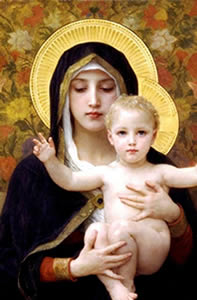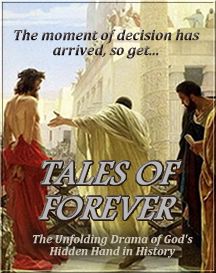Misconception #40
Mary the Mother of Jesus was Born Via a Virgin Birth Just Like Her Son
We declare: “I believe in Jesus Christ, God’s only Son, our Lord, Who was conceived by the Holy Spirit and born of the Virgin Mary. Jesus suffered under Pontius Pilate and was crucified; He died and was buried. He descended to the dead; on the third day He rose again; and He ascended to Heaven. Now He is seated at the right hand of the Father, and He will come to judge the living and the dead.”
This excerpt, which describes Jesus’ role in the salvation of humanity, comes to us from the Apostles’ Creed, a statement of faith that expresses the core elements of what we believe to be true of the Gospel of Christ. All agree, for example, that Jesus was born of the Virgin Mary—Catholics and non-Catholics alike. Because God demanded a perfect sacrifice to satisfy the requirements of the Law, Jesus, as the Lamb of God, had to be perfect in all His ways, from the moment He was born till the moment He died. It also demanded, say theologians, that He be born without sin—thus the virgin birth was required to guarantee Christ’s absolute perfection.
But what we don’t all agree on is the issue of whether or not Mary herself was also born as the result of a virgin birth. Catholics say she was; non-Catholics say she wasn’t. And the first thing critics of the virgin birth of Mary point to is the Apostles’ Creed, which was approved by the Catholic Church in the fourth century. It states that Jesus was born of a virgin; however, any mention of Mary having been born in a similar way is clearly absent.
So, if Catholic doctrine in the fourth century didn’t include the belief that Mary had been born of a virgin, when did it start and why?
Story Continues Below
Says Richard Price—the founder and CEO of Academia.edu—on his podcast In Depth With Academia:
Fish Tales (From the Belly of the Whale): Fifty of the Greatest Misconceptions Ever Blamed on The Bible is:
To hear Price’s book review of Fish Tales (From the Belly of the Whale), CLICK HERE.
To hear Kent and Zen Garcia talk about correcting biblical misconceptions, from September 9th, 2021, CLICK BELOW.
Story Continues From Above
According to most church historians, the idea that Mary was born of a virgin didn’t begin to surface until more than a hundred years after the establishment of the Apostles’ Creed. Officially dubbed the “immaculate conception,” the idea is said to have originated sometime between the fifth and seventh centuries, as more and more people were becoming convinced that in order to conceive the sinless Son of God, Mary herself must have been sinless, too. But to be sinless like Jesus, it wasn’t enough that she be free from sin during her lifetime; it also required that she be born of a virgin like Jesus. And thus, Mary was elevated to just such a status.
So, regardless of whether you accept any of this about Mary’s origins, this is the way most historians explain how the idea of her virgin birth developed.
But is that all there is to the story? Could a belief like this really materialize out of thin air just because well-intentioned believers required it?
Frankly, no, I don’t think so. It’s not the whole story; and I certainly don’t believe an idea like this could’ve just appeared out of nowhere, either. Again and again throughout this list, what we’ve seen is, great misconceptions always take hold as a direct result of their being founded on a solid foundation of scriptural truth.
The question that remains, then, is: Which book of The Bible does it come from? There’s nothing in the canonical record that suggests that Mary was anything more than an ordinary human being. Saintly? Yes. Blessed above all woman? Absolutely. Born of a virgin like Jesus? Hardly.
And believe me: I’m not saying this because I don’t love Mary with all my heart. I thank the Lord above for what she did for us. What she went through, in being the mother of Jesus, is beyond belief. Facing the dilemma of being pregnant while still only engaged, and having to tell Joseph about it. Knowing she’d given birth to the most special child in the world, yet having to face all the unknown factors that that high privilege forced upon her. Watching the life and death of her Son unfold before her in all its bittersweet irony.
Jesus was all her Son, yet all God’s Son. Though she suckled Him and raised Him, she was at times spurned by Him. As a child, Jesus wandered off by Himself, and only later did Mary and Joseph find Him at the Temple. Imagine, then, her sadness when, even at the age of twelve, He was already distancing Himself from her. “Why are you looking for Me?” He asked His parents. “Don’t you know I have to take care of My Father’s business?”1
Then, when her Son had grown to manhood, Mary had wished to speak with Him, so Jesus’ disciples told Him that His mother was outside their tent looking for Him. Again, we can only imagine how she felt when she heard His reply—not brought to her personally but by someone else. His response: “Who’s My mother?”2
And still later, when Jesus was betrayed and all His followers fled the scene in terror, she didn’t abandon Him. Watching Him hang on the cross, scorned, rejected, an object of revulsion—she stood with Him until the end.
So, do I admire her? Yes. Do I love her? Absolutely. Do I worship her because I think she was born of a virgin like Jesus? Hardly. I don’t worship her because the Lord tells us to have no other God but Him. And I don’t think she was born of a virgin because there’s nothing in The Bible that tells me she was.
However, just because I don’t worship Mary doesn’t mean I don’t love her any less. Just because I don’t think she was born of a virgin doesn’t mean I don’t admire her any less for what she did, in bearing and raising Jesus, and enduring all she suffered because of her undying loyalty to Him.
So, having ruled out the canonical record as a potential source for the idea that Mary was born of a virgin, where might it have come from?
As it turns out, it originated from a source we’ve already encountered several times in previous essays. I’m talking about the less-familiar passages of the apocryphal literature—in this case, in two texts of what’s known as The Lost Books of The Bible. The first book we’ll look at, appropriately enough, is called The Gospel of the Birth of Mary. And whether or not you choose to accept its inspiration as being of divine origin, one thing seems beyond question. When you read what it says, in the context of this issue of Mary’s unique birth, you can’t help but be intrigued at the possibility that this one little book did in fact influence a great many people who accepted its authenticity.








